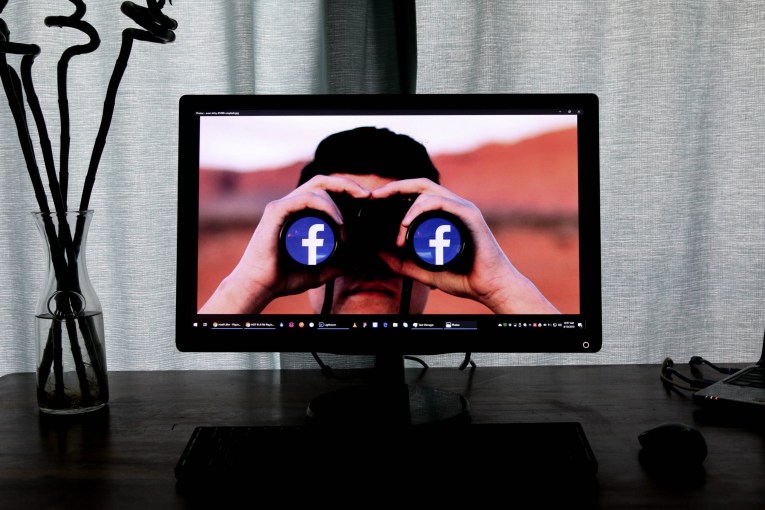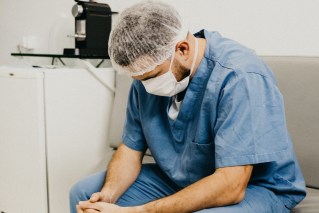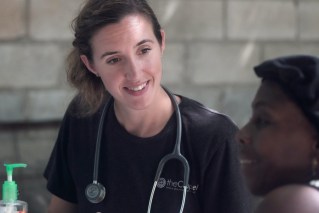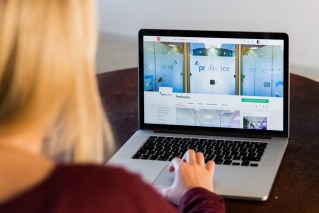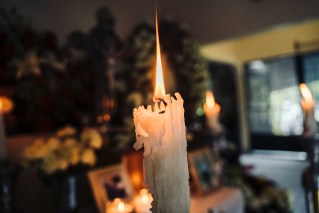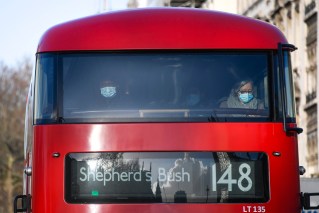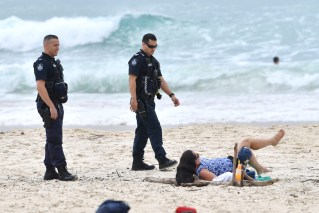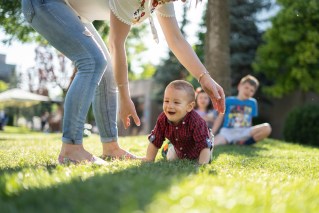Scared, pregnant and deeply conflicted, a very long way from home
Each day this month, we will publish Tales of 2020, the stories of ordinary Queenslanders enduring an extraordinary year. Today, London-based nurse Emma Flynn recalls the frightening days when the virus took hold in Europe – and she learnt she would be bringing a new baby into a troubled world
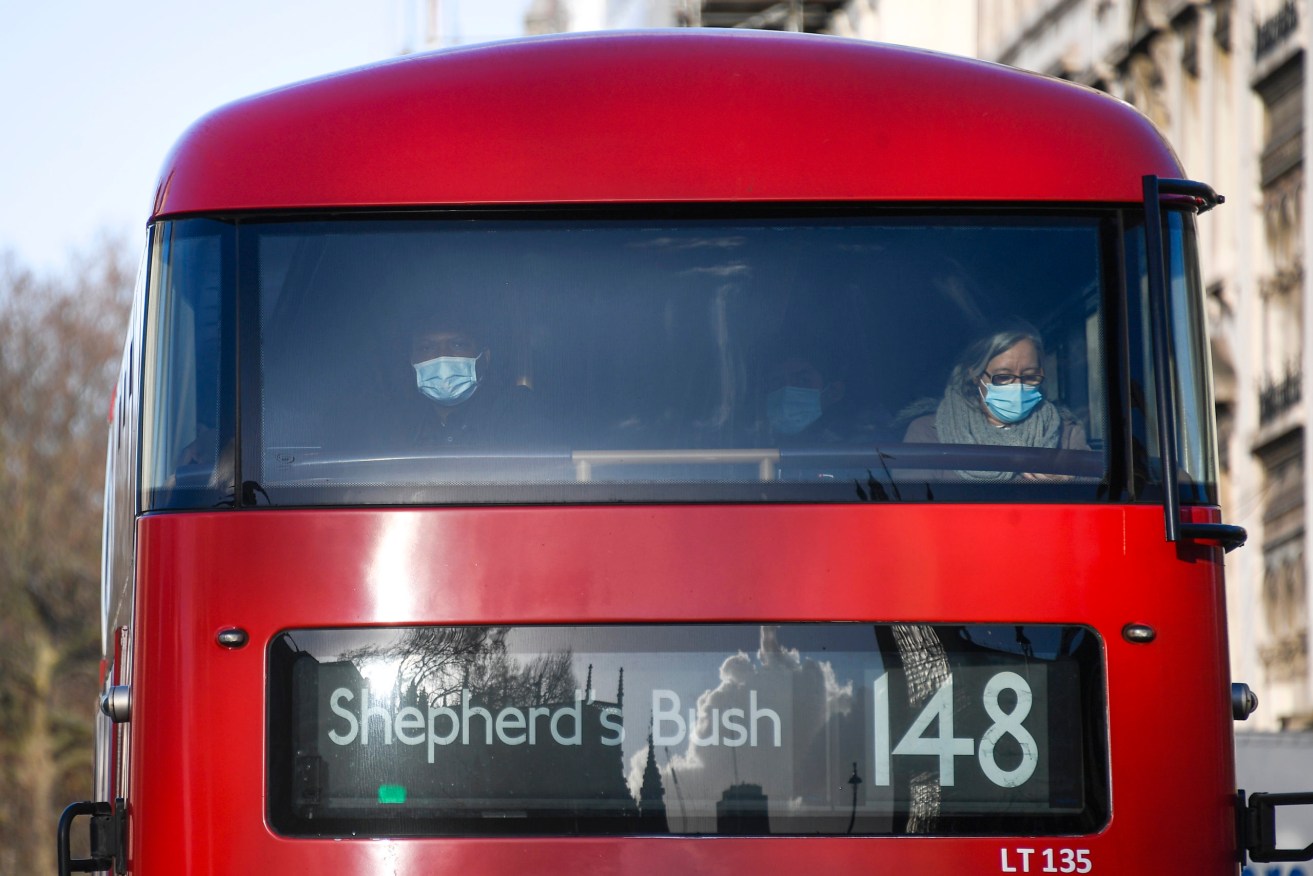
Passengers wear face masks as they sit on a double-decker bus, in London. (Photo: AP Photo/Alberto Pezzali)
I am an Australian nurse living and working in London with my Aussie husband. 2019 ended on such a high for us. We hosted our wedding at home in Brisbane a couple of days after Christmas.
In 2020 we planned to take advantage of living in the UK and travelling as much as possible around Europe before starting a family. For once, we were going to be organised and book our holidays in advance, rather than our usual last minute snap decision of ‘Spain looks good this weekend! Flights are cheap!’.
We have been in London now for over four years and are beginning to feel like locals, having experienced some interesting times; the Brexit referendum, the terrorist attacks on London Bridge, the ascent of Boris Johnston and the demise of Teresa May, and more recently, the COVID 19 pandemic. We live and work here partly because we love to travel and access to Europe is so easy.
Happily, the year started off well, with a week-long ski trip in the French Alps in early February. This was the first time we were really becoming aware of the unfolding pandemic. Along with ski lessons, we also had some geography lessons and learned where Wuhan is, a place we had never heard of previously.
We stayed in an amazing, catered chalet with ten other old and new friends, and throughout the week we all started to get a little run down. We put this down to too much fun on and off the slopes, but, in reality, it could very well have been COVID.
We had, after all, travelled through Geneva and spent quite a long time in Geneva airport, a place we later found out had been visited by a super spreader of the coronavirus only three days earlier. That same super spreader has been attributed with bringing COVID to the UK unknowingly, after spending a week in a ski chalet in the French alps.
Landing back in London, everything started to change. The super spreader had also landed back in the UK and this is when news reports really started to ramp up. It did not take long for London to become the epicentre of the disease in the UK.
As a nurse at a major London hospital, news of the pandemic and its potentially lethal impact started to filter through before the mainstream media whipped up the frenzy of their fear campaign.
We were hearing predications at the end of February about the arrival of the virus on UK shores and its potential impact. In the area where I work, not large geographically, there was talk of 4000 deaths. The forecasts were frightening.
After a visitor to my husband’s workplace had tested positive for COVID, he was given ten minutes to pack up his desk and collect everything he would need to be able to work from home for the foreseeable future. That was in mid-February.
Meanwhile, I continued to go into work, wondering all the time if I would come in contact with a patient with COVID, become unwell or worse, bring the virus home and make my husband ill. Everyone was feeling tense and stressed.
A Romanian colleague was very concerned about her elderly mother in Romania and not being able to visit her. She would watch the news continuously and began giving us daily reports of the rising death count, when most of us had stopped watching the news as it was too frightening.
By the time the pandemic had reached UK shores we were hearing horror stories from
Italy and Spain, stories of frontline health workers quickly becoming victims. These reports terrified me.
Prior to working in fertility, I had been a senior ICU nurse for nearly a decade. The possibilities of being redeployed to a frontline intensive care unit were strong. Just before the country went into total lockdown on March 23, the IVF unit I worked in was deemed to be non-essential and closed for the duration.
I was angered by this decision as there was nothing “non-essential” about the work we were doing. We treat thousands of infertile couples per year. For so many women assisted reproduction was their only means of pregnancy and, already anxious, the closing of the unit added to their anxiety, frustration, and despair.
Relaying news of the unit’s closure was extremely difficult. We were also treating young women wishing to preserve their fertility prior to chemotherapy rounds to treat their aggressive cancers. Closing the unit robbed so many of these women of the possibility of motherhood.
With increasing numbers of COVID infections, intensive care units were being transformed across the country. Ice rinks were being repurposed as morgues and exhibition halls were being set up as temporary hospitals. It was only a matter of time before the call came for more bodies to staff these re-fashioned ICUs.
A new purpose-built hospital, the Nightingale, was taking shape quickly in the Excel Convention Centre and a call went out for volunteers to nurse there. I felt so compromised. I had the skills and experience to nurse critically ill patients, but I had just discovered that I was pregnant with my first child.
I was scared. Scared at the prospect of being forced to work in an extremely high-risk transmission area, scared of contracting COVID and losing my baby, scared that I would make my husband unwell, scared that I wouldn’t be able to go home and see my family in Australia if any of them became unwell.
I also felt incredibly guilty. I was in a unique position to be able to help the most vulnerable people, and yet I was actively choosing not to. I needed to protect my most vulnerable person, my unborn baby. The evening that the prime minister Boris Johnson announced that all pregnant women were vulnerable and needed to take additional precautions, I cried with relief on my walk home. I would not be redeployed.
Finding out that I was pregnant in the midst of the worst pandemic in recent history is not ideal. Still so little is known about this virus and how it affects the developing foetus. We were telling our patients that it wasn’t safe to get pregnant in the current climate, and I was hearing from other colleagues’ comments like “I don’t understand why the patients still want to go ahead with treatment, I certainly wouldn’t want to be pregnant at the moment”.
We had not shared news of the pregnancy with our families as I wanted to be assured that all was well first. I had a series of tests and my first ultrasound at this time. This is normally something shared with the father, but no one was allowed to accompany me to hospital for the event.
My appointments with the midwife in these early days was by phone or videoconference. It was all slightly surreal, and I was grateful for my own midwifery training which has stood me in good stead.
Sharing the news of the baby with our parents was a highlight of our Easter weekend.
We waited a couple more weeks before sharing with our siblings and even longer before telling the rest of the family. There has naturally been a bit of disappointment about the timing and the fact that we are all separated by such distance during this first pregnancy, and first paternal grandchild.
We send lots of photos, exchange many messages and we are very grateful for the social media platforms which will need to substitute for regular visits and chats. The baby is due in early November and I know that my mother lives in hope that travel restrictions will be lifted by then so that she can meet this third grandchild. We are reconciled to having this little one on our own.
As I write I am beginning to feel my baby move. It is a beautiful feeling and something positive to focus on. I am also awaiting a test to see if I have COVID antibodies from our time in the alps.
We continue to take life slowly and carefully and as we do so, we rejoice in the good news of our baby growing during these extraordinary times.
Emma Flynn Is an Australian nurse living and working in London.
This article was first published in Stories from the Heart, an e-book edited by Dr Johanna Skinner and editor Jane Connolly, and is republished with their permission.
